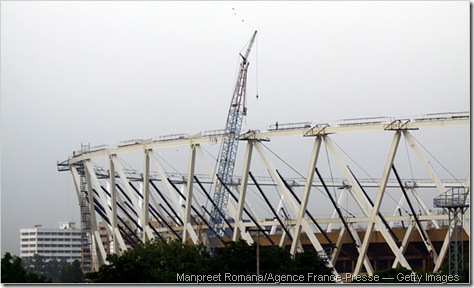By Jim Yardley / NYTimes.com
 The roof of the city’s new domestic airport terminal partly collapsed in August. A Metro commuter train derailed the same month, and then a second Metro train derailed in September. The city’s roads are so pockmarked with bathtub-size potholes that newspapers feature regular photo essays of the most egregiously epic offenders.
The roof of the city’s new domestic airport terminal partly collapsed in August. A Metro commuter train derailed the same month, and then a second Metro train derailed in September. The city’s roads are so pockmarked with bathtub-size potholes that newspapers feature regular photo essays of the most egregiously epic offenders.
Summer had already brought a litany of infrastructure travails in New Delhi, and then Michael Fennell, chairman of the Commonwealth Games, came to town. His task was to inspect the progress of stadiums, bridges and roads as New Delhi prepares to host in October 2010 the athletic competition between nations and territories of the former British Empire, the first major international sporting event in the city in 27 years.
Indian leaders, mindful of how the Olympics elevated Beijing’s international profile in 2008, had hoped that the Commonwealth Games would establish New Delhi as a sporting capital, burnish India’s reputation as an emerging, modern power and, perhaps, position the country to bid for the 2024 Olympics. Except that Mr. Fennell concluded that New Delhi was lagging far behind schedule on construction projects and criticized organizers for a “lack of preparations,” even calling for direct intervention from Prime Minister Manmohan Singh. Recriminations swept through the local news media about New Delhi’s inability to get it done.
India has never enjoyed a reputation for bureaucratic efficiency, and the controversy over the Commonwealth Games has placed an international spotlight on the familiar local problem of ineffective governing. New Delhi presents an especially vivid portrait of the shortcomings of Indian bureaucracy because the city of more than 16 million people is not overseen by one governmental body but several. As a result, coordinating even minor projects, much less a major sporting event, is often undercut by inefficiency and a lack of bureaucratic cooperation.
The city’s government flow chart is a bureaucratic maze. Because New Delhi is the national capital, its land and police are controlled by the national government. The New Delhi state government (a misleading title since New Delhi is not a state) has governing authority over the city, though a different governmental body, the Municipal Corporation of Delhi, or M.C.D., handles issues like roads, sewage and local taxation.
Meanwhile, the New Delhi Municipal Corporation, a federal entity known as the N.D.M.C., governs Lutyen’s Delhi, so named for the British architect who designed what is now the city’s leafy center of government. And do not forget the Delhi Cantonment Board, or D.C.B., which has authority over military land, or the Delhi Development Authority, or D.D.A., another federal entity with oversight over, yes, development.
Partha Mukhopadhyay, a scholar at the Center for Policy Research, a leading policy research organization in New Delhi, said the arrangement could complicate even basic improvement projects. The state government, for example, has authority over water while the Municipal Corporation of Delhi has authority over roads, meaning that merely installing underground water pipes can require interagency cooperation.
Often the job gets done poorly, if at all.
“In terms of governance, the city is just completely messed up,” said Mr. Mukhopadhyay, whose specialties include urban affairs.
Most city residents factor civic inefficiencies into their daily lives. Power failures are so common that many people buy backup generators for their homes. Water service can be so bad that wealthier people keep storage tanks atop their homes, while the poor wait for water trucks to refill their buckets. Public expectations for efficient government are fairly low, but hosting an international sporting event is a different matter.
“The Commonwealth Games present a problem because the work actually has to get done,” Mr. Mukhopadhyay said. “There are hard deadlines.”
The controversy finally brought action from Palaniappan Chidambaram, the home minister. Mr. Chidambaram, the federal government’s point man on New Delhi, has called on Delhi residents to improve their manners and curb spitting and public urination. Earlier this month, he ordered that the municipal government be placed under the direct authority of Sheila Dikshit, chief minister of the state government. The move, which has not yet been carried out, infuriated the Bharatiya Janata Party, or B.J.P., because the new arrangement would place the B.J.P.-dominated municipal government under the thumb of the Congress Party’s state government.
Not everyone blames the city’s convoluted governmental architecture for bad governing. Arvind Kejriwal, an advocate for greater government accountability, blames inadequate public oversight of elected officials for shoddy public infrastructure and graft. Mr. Kejriwal said the system had too few outlets, like public hearings, to hold local governments accountable.
“The people have absolutely no say in day-to-day governance,” said Mr. Kejriwal, who runs a nonprofit anticorruption group, Parivartan.
New Delhi last hosted an international sports competition in 1982 when it welcomed the Asian Games. At the time, the construction effort was led by Jagmohan, then acting as the city’s lieutenant governor (another seat of authority). Mr. Jagmohan, who uses only one name, said practical issues like problems with sites or other concerns often trumped any institutional problems. He said the pressure of a deadline would be likely to focus government attention.
“The government’s prestige is on the line,” he said. “They will put their best foot forward.”
One recent afternoon at the site of the planned swimming stadium, workers were still installing the tall concrete pillars that form the exterior skeleton of the arena. With the project months behind schedule, an administrator, who asked not to be named, said work had been slowed by unexpected excavation problems, among other things. But he said three shifts were now working round-the-clock after a top sports official came to the work site and gave everyone a tongue-lashing.
“It will be finished,” the engineer promised.
Hari Kumar contributed reporting.